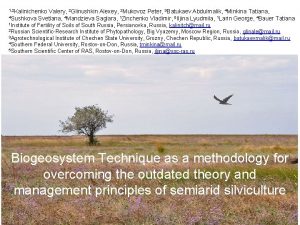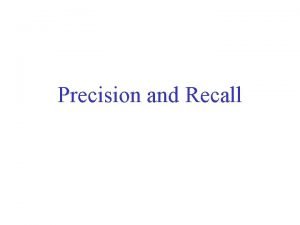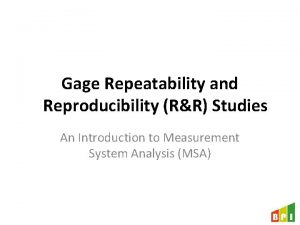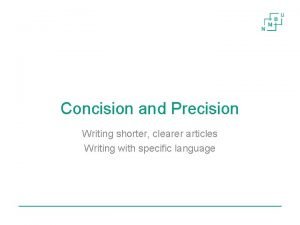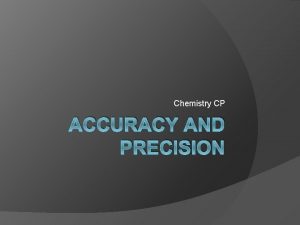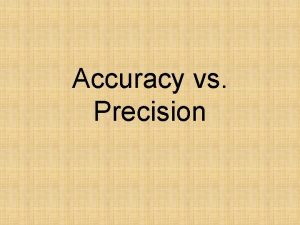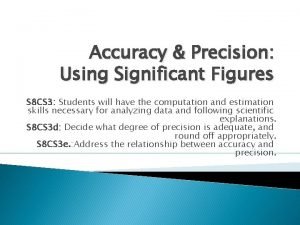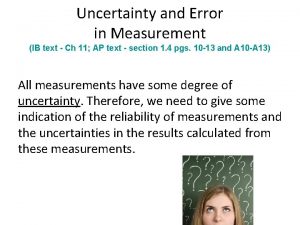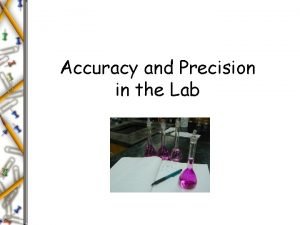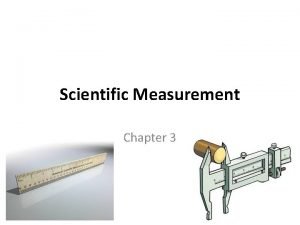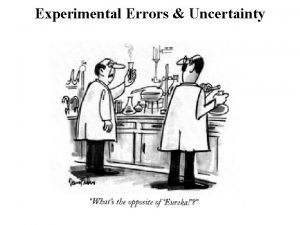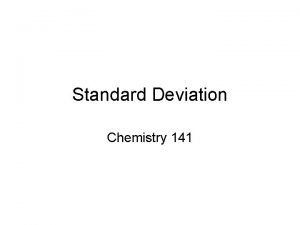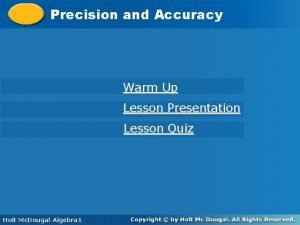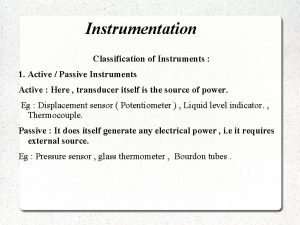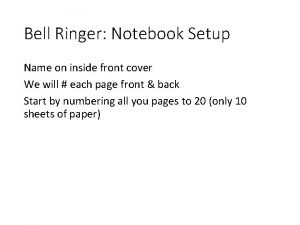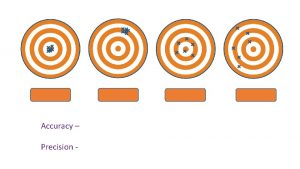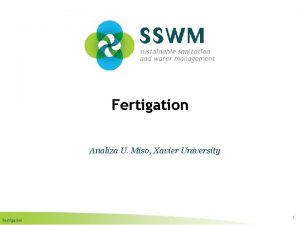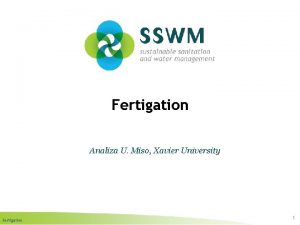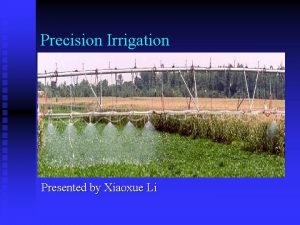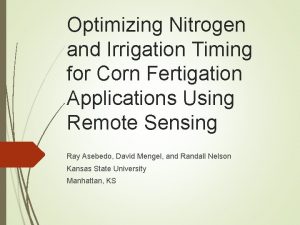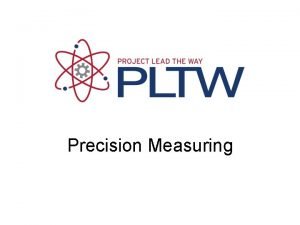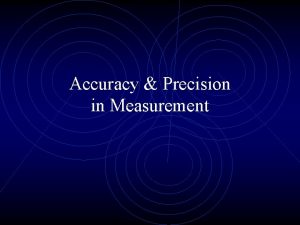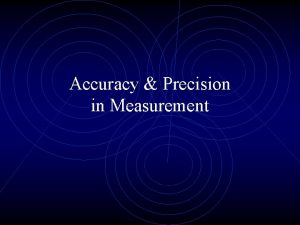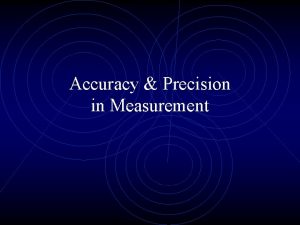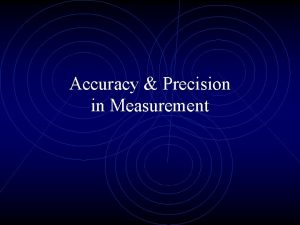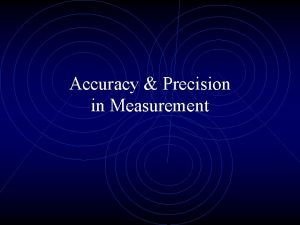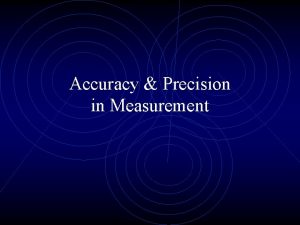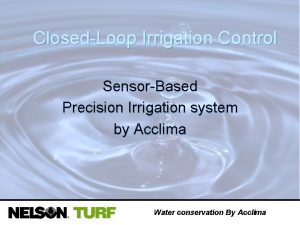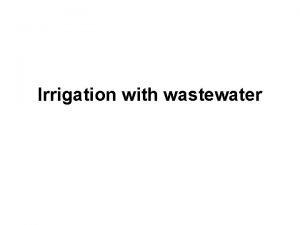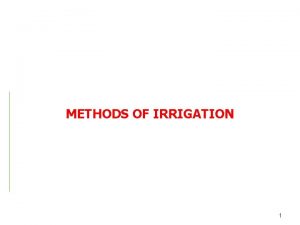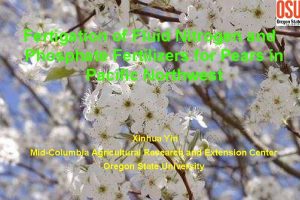Precision Irrigation and Fertigation What is Irrigation Irrigation




















- Slides: 20

Precision Irrigation and Fertigation

What is Irrigation? Ø Irrigation is the application of water to a crop for assisting the production of a crop. What is precision? Ø A degree of mutual agreement among a series of individual measurements, values, or results.

What are we looking for in precision irrigation? Irrigation Efficiency and/or Uniform Coverage Ø Plus site-specific application Ø Efficiency is what you get out, for what you put in. Efficiency = output / input OR Water stored in root zone / water delivered to the field

Decreased Efficiency Wind Drift Evaporation from vegetation Evaporation from soil surface Infiltration Runoff Deep percolation

Flood Drip Furrow Spray

Spray Irrigation Evaporation (Major Loss) l Wind speed l Humidity l Air temperature l Canopy density l Sprinkler evaluation l Sprinkler pressure Ø Deep Percolation (Minor Loss) l System uniformity l Total application depth Ø Runoff (Minor Loss) l Application rate l Slope l Vegetation Density Ø

Furrow Irrigation Ø Evaporation (Minor Loss) l l l Ø Deep percolation (Major Loss) l l l Ø Wind speed Humidity Air temperature Unit flow rate Field length Soil texture Field slope Total application depth Runoff (Major Loss) l l l Unit flow rate Field slope Soil texture

Drip Irrigation Ø Evaporation (Minor Loss) l Minor soil surface evaporation for drip Ø Deep percolation (Minor Loss) l l System uniformity Total application depth Ø Runoff (Minor Loss)

How to Improve Irrigation System Ø Night Irrigation – Low temp, low wind, high humidity Ø Lower operating pressure – bigger droplet size Ø Low drift nozzles – bigger droplet size Ø New Technology

Low Energy Precision Application (LEPA) Ø Irrigates with the plant rows Ø Drops water in the furrow Approximately 90% application efficiency

Efficiency Ø Standard Multi Sprinkler 75 -80% Ø Moving Multi Sprinkler l LEPA Ø High Pressure Gun Ø Standard Flood Ø Drip Irrigation 90+% 60 -75% 40 -70% 90% A high efficient irrigation system will help increase the precision of the application of water and nutrients to the plant.

Fertigation / Chemigation The use of an irrigation system to apply the necessary application of nutrients or chemicals to the crop.

Management Need to know and understand the equipment.

Advantages Ø Uniformity of application Ø Prescription applications Ø Economics - expense Ø Timelines Ø Incorporation and Activation Ø Reduced Compaction Ø Operator hazard

Disadvantages Ø Calibration of equipment Ø Additional equipment Ø Environmental Hazard Ø Increased application times Ø Unnecessary Water Applications

Why use Fertigation? Ø Your irrigation system does the work. Ø Overfeeding and Underfeeding is decreased. Ø Dry applications need water to dissolve the granules. Ø With precise application, the overall amount of chemicals applied is reduced vs. the dry application.

Precision Irrigation The use of fertigation or chemigation with site-specific technology. Ø Technology l l l GPS – locate soil type, water holes, weeds, obstructions, and boundaries GIS (Geographical Information System) works with data captured from spatial reference points. VRT (Variable-rate controllers) System “Brain” sets the rate of application dependent on soil type, slopes, ponds…etc. Weather Station / Mesonet (ET rate) Green Seeker / Weed Seeker • NIR (Near Infrared Band) • Red (Red Band) • Thermo sensor

Site Specific Irrigation/Fertigation Pivot Animation

Sources Ø Ø Ø Ø www. florence. ars. usda. gov/ www. betterpivots. com/how. html http: //weather. nmsu. edu/ www. nrw. gld. gov. au/ www. ag. ndsu. nodak. edu/abeng/ www. fertigationsystems. com http: //msucares. com/pubs/pulications/p 1551. htm Dr. Kizer. Oklahoma State University. April 18, 2008

Questions?
 Fertigation
Fertigation Non precision measuring instrument
Non precision measuring instrument Precision and semi precision attachments
Precision and semi precision attachments Negatif sayıların binary gösterimi
Negatif sayıların binary gösterimi What is precision and recall in information retrieval
What is precision and recall in information retrieval Gage repeatability and reproducibility
Gage repeatability and reproducibility Precision and concision
Precision and concision Accuracy chemistry definition
Accuracy chemistry definition Difference accuracy and precision
Difference accuracy and precision Accuracy and precision significant figures
Accuracy and precision significant figures Error propagation multiplication
Error propagation multiplication Why is it important to defend your faith
Why is it important to defend your faith Accuracy and precision lab
Accuracy and precision lab Quick lab accuracy and precision answers
Quick lab accuracy and precision answers Experimental error definition
Experimental error definition Brainpop precision and accuracy quiz answers
Brainpop precision and accuracy quiz answers Deviation in chemistry
Deviation in chemistry Precision definition
Precision definition Potentiometer passive or active
Potentiometer passive or active Precision and accuracy
Precision and accuracy K h da b d c m
K h da b d c m
